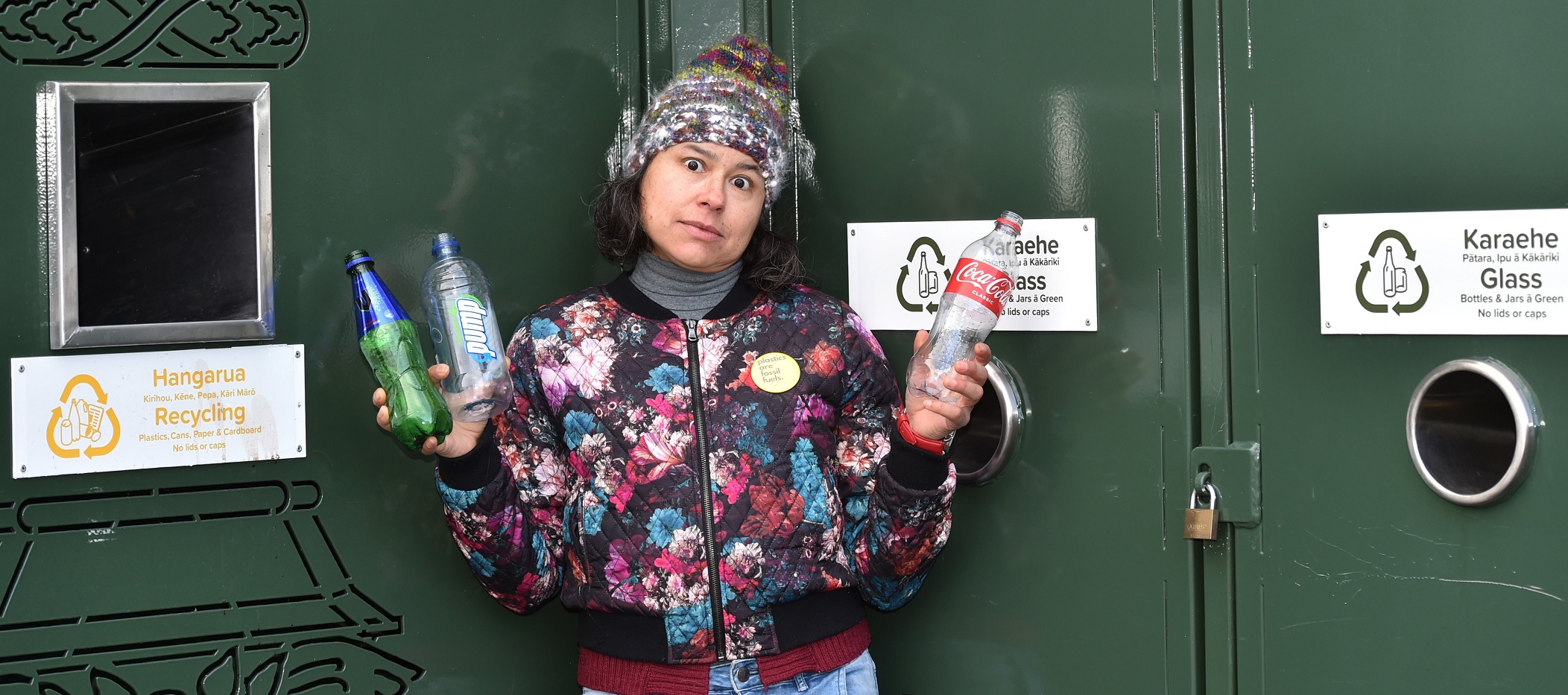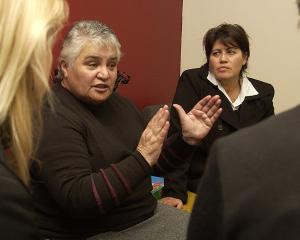
When Alejandra Parra needed backing for her waste-busting work in Chile, she chose the United Nations’ committee on the elimination of racial discrimination.
It might not seem the obvious choice, but the environmental activist was trying to stop town waste being dumped near indigenous Mapuche communities in the country’s south.
And it worked, Parra says. The committee supported her argument, urging the Chilean government to find a resolution.
"We used that to push for the closing of these dumps and a lot of them were closed," she says.
It was another small but important victory against the notion that out of sight is out of mind.
But an even bigger prize is now in the offing for Parra and others working to stem and turn back the modern world’s seemingly inexorable tide of waste.
Later this year, the international community will gather in Korea for what is hoped will be final talks on an international plastics treaty.
Parra will be there. She was recently in Dunedin catching up with friends made when completing a master’s of planning at the University of Otago, but she brought her treaty work with her, too. All sides are engaged in a furious final effort to shape the document — both those speaking for the environment and those lobbying for the interests of plastics producers.
For Parra, issues of human rights and justice are inseparable from the work of cleaning up the environment.
The waste hierarchies that are discussed most often in relation to plastics are about the best ways to reduce its impact. However, there’s another waste hierarchy that operates often unspoken, and it means that the people at the bottom of the hierarchy end up with the waste. In Chile, that was the Mapuche. Elsewhere the problem is transnational, poorer countries groaning under the exported tonnage of the global north’s waste exports. South America operates as a dumping ground for materials exported from North America and Europe under the pretext of recycling. New Zealand sends thousands of tonnes of plastic waste to South East Asia.
Many hope the international treaty will shift the focus on to reducing plastic production, and away from the limited contribution recycling can make, finally arresting these waste flows.
The work on an international agreement began in earnest in 2022, when a UN meeting of 175 countries voted to progress a global treaty for plastic pollution, which would address the full lifecycle of plastic, including its production, design and disposal.
That UN Environment Assembly (UNEA-5) meeting set up an intergovernmental negotiating committee (INC), which is working towards the goal of a legally binding agreement by the end of the year. Its final meeting, known as INC-5, is scheduled for Korea in November.
Parra, who is part of an expert group contributing to the work, is not expecting the Korea meeting to be straightforward; progress to date has been slow and there are still many points of contention.
Vested interests have been pushing back hard, she says. It will be a battlefield.
"We haven’t advanced a lot in the negotiations. There is a group of countries that have been stopping the process from moving forward."
They are principally oil-producing countries and those nations that host the big petrochemical producers of plastics.
China, Europe and North America all feature among the latter.
"But the biggest countries pushing to stop the process moving forward are the oil producers, like Saudi Arabia."
Oil producers are betting big on plastic production stepping in to replace lost revenue as the world switches to renewables to address the climate crisis.
"It’s their plan B, for when they won’t be able to sell oil for fuel any more, for energy purposes," Parra says.
More than 99% of plastics are made from fossil fuels. The shale gas boom in the United States is fuelling a plastic production boom there.
It is estimated that petrochemicals could account for more than a third of the growth in oil demand by 2030 and by the middle of the century, global emissions from plastic production could triple to account for one-fifth of the Earth’s remaining carbon budget.
So, there are myriad reasons to tackle the plastic problem, but the recent release of an updated draft text of the proposed plastics treaty will not have altered Parra’s assessment of the hard work ahead.
When negotiations began, the INC started with the relatively straightforward proposition that "The objective of this instrument is to end plastic pollution, including in the marine environment, and to protect human health and the environment."
But that concise statement has blown out to a much longer jumble of suggestions, the draft document littered now with competing statements, proposed or disputed by one side or the other.
Parra says momentum for a genuinely comprehensive treaty appeared to be waning at the last talks, in Canada.
Many countries that had been pushing for global targets to reduce plastic production fell silent in the final session, she says.
"Only a very little group of countries stood for those demands."
She fears a weak last-minute compromise in Korea leaving only voluntary measures.
New Zealand has been a member of a "High Ambition Coalition" to end plastic pollution by 2040, but after the new coalition government revised its "negotiating mandate" — the basis on which it will engage in Korea — earlier this year, there is concern its resolve is weakening.
Among the changes to the mandate was removing references to climate change and the circular economy and a lesser emphasis on health concerns, and what looks like a hedging of its position on plastics used in the fishing industry.
A cabinet paper in April, from Environment Minister Penny Simmonds’ office, says any potential treaty provisions on fishing gear "would require negotiation to ensure that they do not create undue burdens or impediments".
Plastics from the fishing industry, including lines and discarded traps, have been found to make up the bulk of plastic pollution on ocean reefs.
A report by the prime minister’s chief science adviser estimated that about one-fifth of all marine plastics pollution was generated from maritime uses, with commercial fisheries being a large contributor. At least 46% of plastic waste in the Great Pacific Garbage Patch comes from fisheries, and the UN estimates at least 640,000 tonnes of fishing gear is lost every year.
Simmonds, responding to questions, says there is a need to avoid overly burdensome requirements that could lead to responsible fisheries operators being unable to comply.
"New Zealand supports clear sector-based requirements in the treaty, to enable sectors to meet the provisions of the treaty," she says.
Asked what sort of reduction in the production of fossil-fuel based plastics the government supports, Simmonds did not put a figure on it. She said she would be advocating for a treaty that was based on the best available scientific evidence.
"To reduce plastic pollution, action is needed across the full lifecycle of plastic," she says.
"Cabinet has also agreed that New Zealand will advocate to address transboundary plastic pollution by avoiding or reducing plastic waste in the first place."
There were a range of options under negotiation about how to achieve that, from voluntary through to legally binding measures, she says.
Green Party zero waste spokeswoman Kahurangi Carter says the lesser weight given to considerations of health impacts in the updated mandate is concerning.
"Plastic pollution, with its associated toxins and microplastics, presents significant risks to human health and the environment," she says.
The previous government’s mandate supported a "one health" approach, that aimed to optimise the health of people, animals and ecosystems, but this is missing from the new mandate.
"Mitigating the impacts of plastic production and waste on human health and environmental integrity must be at the forefront of global efforts," Carter says.
"This includes addressing the toxic chemicals used in plastic manufacturing and preventing microplastics from infiltrating our waterways and food chains."
Massey University Prof Trisia Farrelly, who has worked extensively on the treaty, has weighed in on the health issues associated with plastics and the way in which vested interests hampered progress at the Canada negotiations.
"Effective global plastics treaty negotiations were once again delayed and derailed by member states with vested interests in fossil fuel and petrochemical proliferation who shed doubt on independent scientific consensus including the known health impacts of plastic chemicals, and nano- and microplastics," she has said.
Among recent scientific studies was one that found patients with heart disease were likely to have plastic in the blockages in their arteries, while the World Health Organisation (WHO) says we’re all now drinking microplastics. Some can be absorbed into our organs and the microplastics can both carry disease-causing bacteria and help bacteria become resistant to antibiotics.
The Labour Party’s environment spokeswoman, Rachel Brooking, also has misgivings about the new mandate, particularly about the way it skirts the issue of climate change.
"Plastic pollution comes from fossil fuels and is clearly a climate issue; ignoring that fact is negligent."
Among other contentious issues negotiators will face in Korea is whether waste incineration should be regarded as a legitimate pathway for dealing with plastics.
Simmonds says she’s receiving advice, including on waste-to-energy and chemical recycling.
The section on those issues is redacted from the published mandate.
Some forms of waste-to-energy already exist in New Zealand, she says.
"However, some forms of waste-to-energy have greater risks associated with them, which need to be well managed."
Parra remains unconvinced by such technologies. She’s been battling against an incinerator in her own home city since 2016.
"They just change one way of contamination for another that is less visible but more toxic."
Other options favoured by the oil industry include pyrolysis, where plastic waste is converted back into oil, and a system of plastic credits, similar to carbon credits.
Parra points out that credit systems do not have a good track record and oil produced by pyrolysis tends to be particularly toxic, contaminated by the chemicals in the plastic feedstock.
"It’s just greenwashing, basically."
While the debate continues, plastic pollution keeps on mounding.
A UN Environment Programme (Unep) report last year put world plastic production at 430million metric tonnes a year, more than two-thirds of which soon becomes waste, a growing amount after a single use. Plastic production is set to triple by 2060 if "business as usual" continues.
It’s not like there haven’t been efforts to turn this around. The WWF reports that the number of national and voluntary actions to tackle the problem has increased by 60% in recent years. However, plastic pollution has continued to increase.
At this stage, the goal of ending plastic pollution survives in the draft plastics treaty text, an ambition to address the whole life cycle of plastics from the extraction of raw material until the end of its life.
"If you only focus on waste management, you’re not going to be able to solve anything because the production is growing every year and exponentially," Parra says.
"We have to stop the production, reduce it dramatically. There are studies that say that just to align with the Paris Agreement of a 1.5°C limit to global warming, the production of plastics has to reduce between 12% and 18% every year, starting from this year."
She will be at the final negotiations as part of a coalition of environmental organisations from around the world.
They want to see legally binding targets and at least a 70% reduction of the current plastic production.
Failure means generations to come will be faced with the impacts, she says.
"We now drink microplastics, we breathe microplastics, we eat microplastic and it has to stop."












